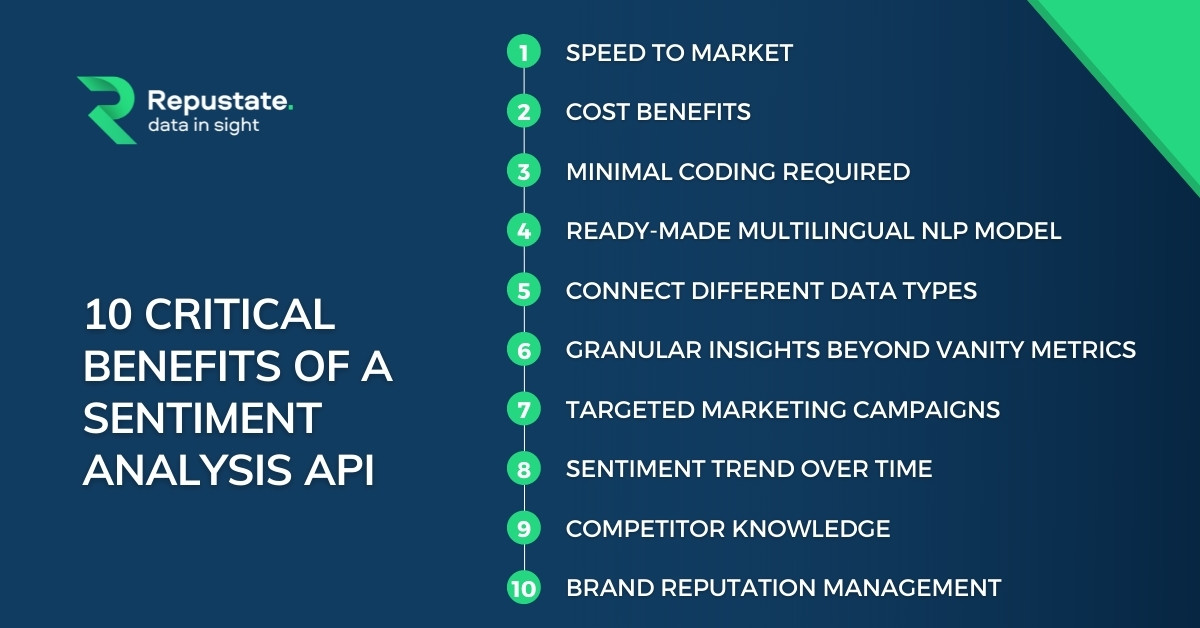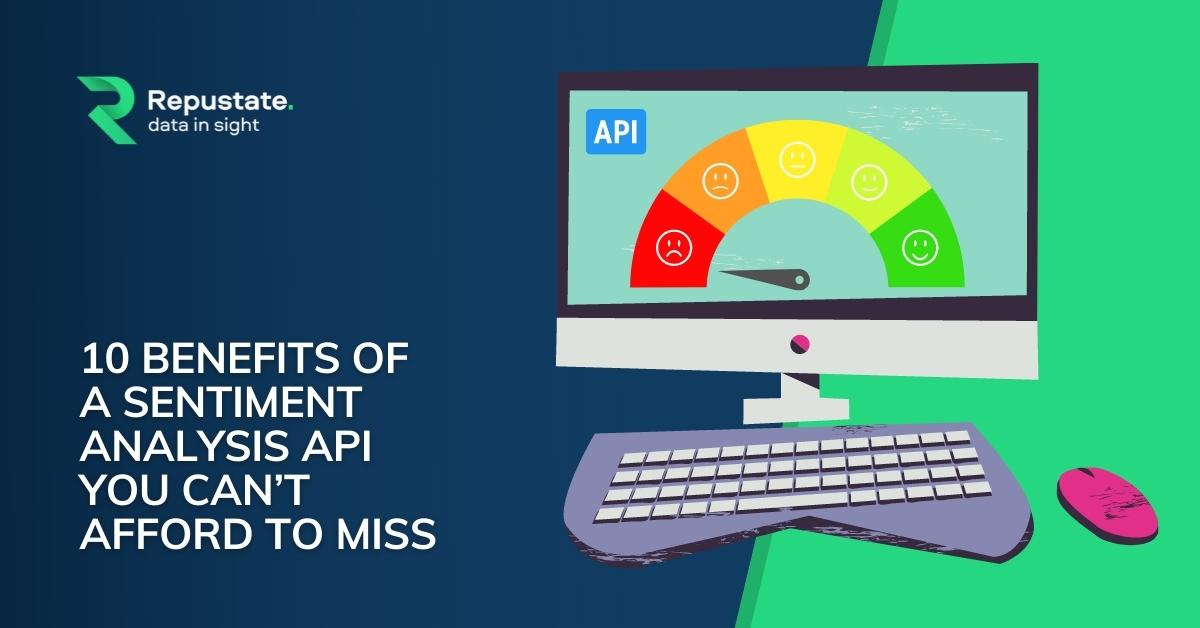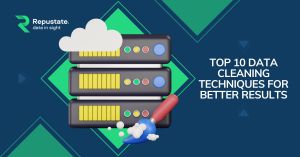10 Benefits of A Sentiment Analysis API You Can’t Afford To Miss
A sentiment analysis API empowers you to extract intelligence from vast amounts of unstructured data for important business functions such as brand monitoring from news and social media, customer experience (CX) strategies, employee experience (EX) management, and more. Not just a standalone product, once a sentiment analysis API is trained to your needs, it can be seamlessly integrated into your legacy model for sentiment mining to magnify data insights.
Thus, as a marketing head or a human resource manager, you discover more granular, action-based intelligence than before. And if you’re a data scientist, you find a reliable means to get the benefits of sentiment analysis through enriched metadata.
This blog articulates these and other key advantages of a sentiment analysis API, which you cannot afford to ignore.
What Is Sentiment Analysis?
Sentiment analysis is a machine learning technique that automatically detects emotions from data. This data can be from any source - internal or external to an organization - and any type, such as text, video, or audio. Sentiment analysis allows you to glean information from review forums or even unsolicited feedback that people express on social media. The major benefits of sentiment analysis, though, lie in experience analytics, such as customer experience analysis or CX analytics, employee experience (EX) analytics, and brand experience.
How Does A Sentiment Analysis API Help?
A sentiment analysis API is a software intermediary that allows two software applications to connect and exchange information. As a data analyst, you may want to enrich your existing sentiment model’s metadata cost-efficiency and quickly, or as a product manager, you may need additional or niche information to help your sales team upsell. In both cases, a sentiment analysis API provides you with the advantage of integrating data between different applications and extracting information from varied sources. Thus, you can conduct voice of the customer analysis with social listening data or discover consumer trends through Google reviews analysis, easily and without downtime.
Which Are the 10 Critical Benefits of a Sentiment Analysis API?
A sentiment analysis API distills accurate insights from your data by using machine learning (ML) tasks such as natural language processing (NLP), semantic clustering, video AI, and others. The beauty of an API is that it connects to your existing system, or you can use it as-is for your requirements as a platform as with Repustate IQ. Once trained and applied to your business, it keeps getting smarter with every iteration learning from your data, thus becoming more and more fast and precise.
In view of this, let’s check out 10 critical benefits you get from a sentiment analysis API that will jumpstart your growth trajectory and make you recession-proof.

1. Speed to market
If you’re a marketing agency that needs to serve multiple clients, all of whom have different needs and are from different industries, you cannot serve them all with just social listening analytics or traditional market research. You need a sentiment analysis API that extracts customer insights from experience data that you can use in your proposed marketing and advertising campaigns.
Not only can you derive in-depth market and consumer insights from all data sources such as social, surveys, videos, chatbots, etc, but also serve clients in multiple industries with customized aspect models. In this way, a sentiment analysis API acts as a catalyst to boost your speed to market.
Read this customer success story to see how a marketing agency developed successful digital marketing tactics for clients like Tinder and Abercrombie & Fitch.
2. Cost benefits
The amount of effort, time, and money it takes to build a sentiment analysis platform from scratch is not feasible for most companies. Perhaps you do have a proprietary sentiment model but have outgrown it or you have found a platform that suits your budget, desired seats, and business needs but does not fulfill all of your requirements. In such situations, a sentiment analysis API is the perfect solution.
When trained and integrated into your existing solution, it will enhance the features of your tech stack, thus saving you additional costs. More importantly, because the AI-driven API keeps learning continuously from the data it analyzes, it becomes smarter, high-precision and more robust with time, thus becoming increasingly valuable.
3. Minimal coding required
Data architects are an integral part of any organization’s growth team because they lend data munging and analytics advantages to all departments - product, advertising & marketing, human resources, and operations. But not all companies have a sizable data analytics team to update or alter aspect models to their changing requirements. With Repustate’s sentiment analysis API, there is minimal coding required. We will go deeper into this in the next section.
4. Ready-made multilingual NLP model
Most multilingual platforms use machine translations, which are rife with inaccuracies and should not be used for analyzing sentiment in multilingual data. A truly multilingual NLP machine learning model has a native part-of-speech tagger built-in for each language it processes. Because these are developed manually for each language, an API that uses one for NLP tasks hits the target every time it analyzes different languages for sentiment. Thus, giving you the benefits of sentiment analysis easily and seamlessly. Once your provider has trained the model to your business needs, all you need to do is plug and play.
5. Connect different data types
Organizational big data is scattered across data warehouses for security reasons as well as to mitigate load. Apart from this, businesses are now also looking at external sources of data to gather insights, whether it’s for improved employee experience, healthcare analytics, or customer engagement.
A sentiment analysis API connects this chasm and integrates data sources to give granular insights from all channels - social media, review forums, surveys, videos, podcasts, blogs, and more. Thus, you get enriched sentiment analysis benefits at a much higher level for a 360 view of your project.
6. Granular insights beyond vanity metrics
The primary objective of data analytics is to provide the reasons behind patterns of behavior- whether it’s employees or consumers. Vanity metrics-based social analytics such as the number of likes, dislikes, shares, etc. give no real insight into audience behavior. That is why product marketing and sales teams are befuddled as to why there is no actual impact on business growth despite high social engagement.
To derive the benefits of sentiment analysis, an emotion mining API seamlessly integrates with a social API to give you, for example, TikTok consumer insights or YouTube analysis data. That’s how you can discover hidden gems in thousands of social conversations to drive product marketing strategies. Read how Repustate’s sentiment analysis API discovered a hidden market sentiment from a viral McDonald’s logo video.
7. Targeted marketing campaigns
Customer data can tell you many things, chief among those is how you can develop the right approach for segmentation marketing. Products and services that are targeted to different audiences based on age or location, for example, do better such as in the hospitality or sports & entertainment industry.
A sentiment analysis API empowers your marketing team to use these insights for better, more informed tactics that can lead to increased sales conversions. Read how fan experience data based on age demographics played a critical role in in-stadium marketing.
8. Sentiment trend over time
How do you know if your strategy is working or not? A sentiment analysis API allows you to compare historical performance with current data so that you can see if the changes you made to your action-plan had the desired effect or not. You can see the sentiment trend over time and analyze the peaks and troughs to see what caused the change in patterns.
This can give you a holistic view of why your business was affected the way it was, regardless of whether it was positive or negative. Brands like Trivago have built a fortune with this data and grown more than public anticipation with the right strategy backed with such insights.
9. Competitor Knowledge
A sentiment analysis API adds to your competitor research, making it more thorough and actionable. The benefits of sentiment analysis extend not only to extracting information about your own brand but also to how consumers feel about your competitors or a new entrant in the market.
News monitoring with sentiment analysis gives you these insights impeccably, as experienced by news monitoring agency, Media Info Groep, who use Repustate’s sentiment analysis API for the Dutch market for A-list clients such as L’Oreal, Jaguar, Redbull, and others.
10. Brand Reputation Management
In a day and age of social media where no one goes unscathed from public scrutiny, you can’t afford to ignore how every word and phrase in an external corporate statement can affect your brand. Not everyone can afford a fall in stock prices like Tesla and nor should one because leadership comes with the responsibility towards shareholders and employees. This means that brand reputation management should be one’s top priority and with a sentiment analysis API, you can do so efficiently and effectively.
Sentiment Analysis API Documentation
A sentiment analysis API algorithm lets you extract sentiment from any kind of data uploaded as a file, text string, or text/video URL. A solution meant to simplify data analytics for emotion mining, the Repustate API is a simple RESTful API with responses in JSON format. There is no explicit authentication mechanism, which means all you need to do is include your API key in each API request. Let us see some examples.
1. Sentiment analysis
When the API scores sentiment in your data it does so in the range from -1 (negative) to 1 (positive). A 0 score means neutral. Emoticons, emoji, and internet short forms are also analyzed for sentiment in the algorithm.
In this example we analyze the text “This is a great day to go for a run”
curl -d **“text=This is a great day to go for a run”**
https://api.repustate.com/v4/{apikey}/score.json
Response Javascript samples:
{ "score": 0.9229105562880748,
"status": **OK”**
}
2. Sentiment (by topic)
Sentiment analysis of a more complex block of text is processed differently as it may contain several topics. In order to get topic-based sentiment from the data, the API call will scope the sentiment to one (or more) topics. Here, we analyze the text “I love cake but hated the hats.”
. curl -d **“text=I love the cake, but hated the hats&topics=cake,hats”**
https://api.repustate.com/v4/{apikey}/topic.json
Response Javascript samples:
{ "status": "OK",
-"results": [ +{ … }, +{ … } ]
}
3. Aspect-based sentiment
For more granular insights, sentiment alone is not sufficient. The chunk of text may contain several aspects of a particular subject such as price, amenities, or the food menu. And these aspects in the text may carry sentiment. This API call automatically categorizes the text according to industry-specific categories in aspect models like airline, banking, restaurant, etc. In this example, we analyze the text “I loved the rooms but the coffee could have been better”, the aspect model of which being “hotel”.
curl -d **“text=I loved the rooms but the coffee could have been better&model=hotel”**
https://api.repustate.com/v4/{apikey}/aspect.json
Response Javascript samples:
{ -"accommodations": [ +{ … } ],
-"food": [ +{ … } ],
"status": "OK"
}
Read the Repustate API documentation at length.
Conclusion
Powered by machine learning technology that include a robust named entity recognition (NER), search inside video feature, NLP, and others, a sentiment analysis API can empower your business tremendously. It can enrich product marketing teams with granular market insights, human resources teams with EX analytics insights, and propel positive brand experience. More importantly, it can integrate with your own existing model.
 Home
Home
 Mar 1, 2022
Mar 1, 2022

 Jeremy Wemple
Jeremy Wemple
 Dr. Ayman Abdelazem
Dr. Ayman Abdelazem
 Dr. Salah Alnajem, PhD
Dr. Salah Alnajem, PhD
 David Allen
David Allen

 Repustate Team
Repustate Team

